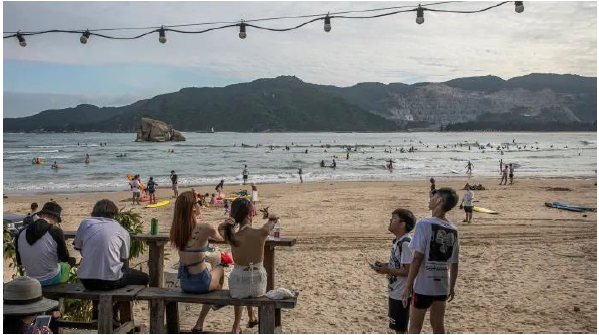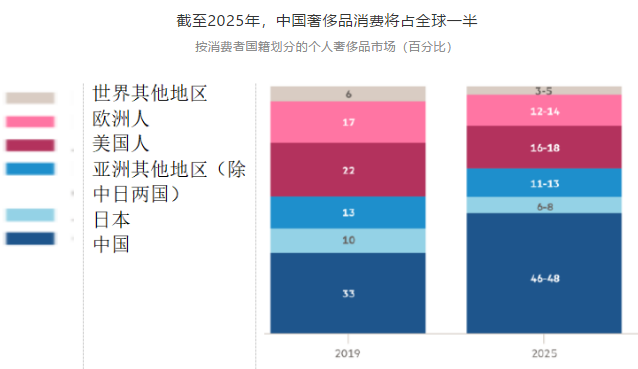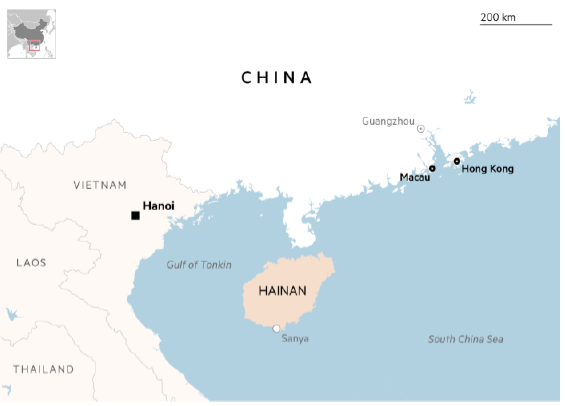作者:佚名 来源于:中国时尚文化网
西方品牌押注中国消费者在疫情过后仍将在国内消费。
Western brandsbet on Chinese shoppers staying at home beyond the Covid-19 pandemic.

海南海滩上的游客。海南这座热带岛屿被称为中国的夏威夷,如今这里是免税购物中心
©Roman Pilipey/EPA-EFE 爱德华·怀特和利拉·阿布德2021年4月16日于首尔和巴黎报道
在中国古代,当诗人、文人和大臣们失宠于中国皇帝时,就会被流放到海南岛,任其在有着土著部落的原始丛林中自生自灭。
When poets,literati and courtiers fell out of favour with China’s emperors, they werebanished to the island of Hainan to fend for themselves among wild jungles andindigenous tribes.
如今,这个被称为中国夏威夷的热带度假胜地,已成为遭受新冠病毒大流行重创的全球奢侈品市场中少有的亮点。
Today, thetropical resort destination known as China’s Hawaii has become a rare brightspot in the global luxury market, which has been hit hard by the coronaviruspandemic.
“海南岛火了。”旗下拥有MichaelKors和范思哲(Versace)品牌的CapriHoldings负责人约翰·D·伊多尔(John D Idol)今年2月对分析师表示。
“Hainan Islandis on fire,” John D Idol, who heads Capri Holdings, owner of the Michael Korsand Versace brands, told analysts in February.
为了刺激国内消费,中国政府已将海南岛变成了一个免税购物中心。游客可以尽情享受古驰(Gucci)和普拉达(Prada)的时装、卡地亚(Cartier)的珠宝、雅诗兰黛(ESTĒE LAUDER)的美容产品或麦卡伦(Macallan)的高档威士忌。
To boostdomestic consumption, the Chinese government has turned the island into aduty-free shopping hub. Visitors can indulge in fashion from Gucci and Prada,jewellery from Cartier, beauty products from Estée Lauder or premium whiskyfrom The Macallan.
由于新冠疫情带来的旅游限制措施,近年来推动奢侈品行业增长的中国购物者不再能够前往巴黎、伦敦、米兰或香港购物,这也使得海南的人气变得更加火爆。
Hainan becameeven more popular when Covid-19 travel restrictions meant Chinese consumers,who have driven luxury sector growth in recent years, could no longer go onshopping trips to Paris, London, Milan or Hong Kong.

资料来源:咨询公司贝恩(Bain)
海南岛是奢侈品重心向中国倾斜的有力象征,这很像几十年前日本购物者的"回流"趋势。他们过去也在国外购买路易威登(Louis Vuitton)和巴黎世家(Balenciaga)的产品,而现在则在国内购买。
The island is apowerful symbol of how luxury’s centre of gravity is tilting towards China,mirroring the “repatriation” trend in earlier decades of Japanese shoppers whoused to buy Louis Vuitton and Balenciaga abroad but now do so at home.
这一点在行业领头羊路易威登集团(LVMH)身上体现得尤为明显。该公司的加速复苏在很大程度上由中国推动。路易威登周二表示,其今年第一季度在亚洲(不包括日本)的销售额比2019年疫情爆发前的同期高出26%。
Nowhere is thisclearer than at sector leader LVMH, whose accelerating recovery has beenfuelled in large part by China. The company said on Tuesday that itsfirst-quarter sales in Asia excluding Japan were 26 per cent higher than in thecorresponding period of 2019, before the pandemic.
分析师们预计,即使中国购物者可以再次旅行,他们也会继续在国内购物。这是因为各大品牌争相开设实体店,并扩大电子商务业务,比如阿里巴巴旗下天猫奢侈品商城的线上商店。
Even whenChinese shoppers can travel again, analysts expect they will continue to buy athome as brands open bricks-and-mortar stores and expand ecommerce offerings,such as virtual stores on Alibaba’s Tmall Luxury Pavilion.
根据咨询公司贝恩(Bain)的数据,中国消费者在国内购买高端产品的比例从2019年的32%飙升至2020年的70%以上。一旦疫情的影响消退,预计到2025年,这一数字将达到55%左右。
The share ofChinese consumers’ high-end purchases within the country soared from 32 percent in 2019 to more than 70 per cent in 2020, according to consultancy Bain,and is expected to be about 55 per cent by 2025 once the pandemic effect fades.
今年三十岁的Amy Dai是这些奢侈品品牌所吸引的典型消费者之一。她居住在重庆,过去曾前往欧洲购买奢侈品,是中国每年1.7亿海外游客中的一员。在疫情爆发前,中国游客的支出占全球奢侈品销售总额的三分之一以上。
Amy Dai isemblematic of the consumer those brands have been able to attract. The30-yearold resident of Chongqing used to make pilgrimages to Europe to buyluxury goods, one of China’s 170m annual overseas travellers whose spendingaccounted for more than a third of all global luxury sales before the pandemicstruck.

1/3 1 2 3 下一页 尾页
上一篇: 梦金园即将登陆CCTV-1《大国品牌养成记》,开创全新黄金时代
下一篇: 紧抓新机遇 共创新时代——2021彩色宝石高质量发展峰会圆满召开
【相关文章】
版权声明:文章观点仅代表作者观点,作为参考,不代表本站观点。部分文章来源于网络,如果网站中图片和文字侵犯了您的版权,请联系我们及时删除处理!转载本站内容,请注明转载网址、作者和出处,避免无谓的侵权纠纷。

